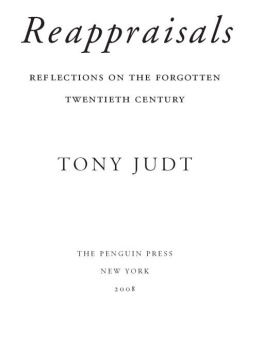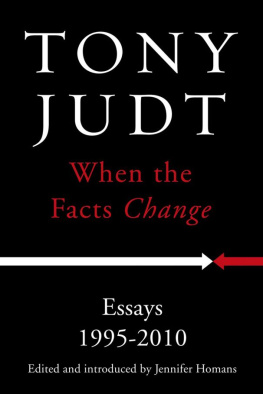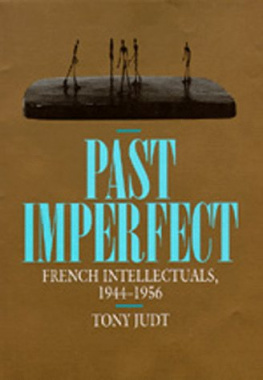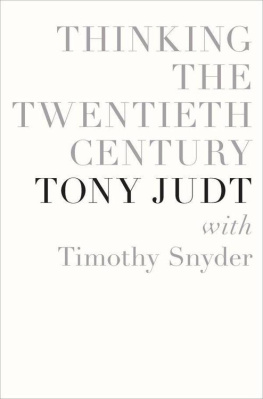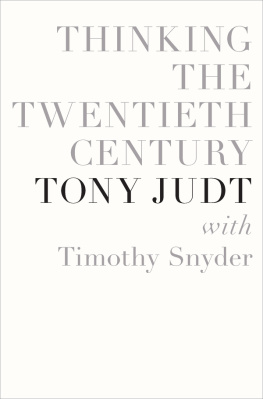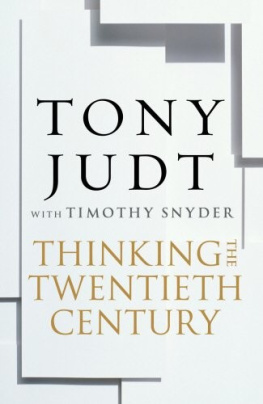Table of Contents
ALSO BY TONY JUDT
La Reconstruction du Parti Socialiste, 1921-1926
Socialism in Provence, 1871-1914
Marxism and the French Left: Studies on Labour and Politics
in France, 1830-1982
Resistance and Revolution in Mediterranean Europe, 1939-1948 (editor)
Past Imperfect: French Intellectuals, 1944-1956
A Grand Illusion? An Essay on Europe
The Burden of Responsibility: Blum, Camus, Aron,
and the French Twentieth Century
The Politics of Retribution in Europe: World War II and Its Aftermath
(with Jan Gross and Istvan Deak)
Language, Nation and State (with Denis Lacorne)
With Us or Against Us: Studies in Global Anti-Americanism
(with Denis Lacorne)
Postwar: A History of Europe since 1945
THE PENGUIN PRESS
Published by the Penguin Group
Penguin Group (USA) Inc., 375 Hudson Street, New York, New York 10014, U.S.A. Penguin
Group (Canada), 90 Eglinton Avenue East, Suite 700, Toronto, Ontario, Canada M4P 2Y3 (a division
of Pearson Penguin Canada Inc.) Penguin Books Ltd, 80 Strand, London WC2R 0RL,
England Penguin Ireland, 25 St. Stephens Green, Dublin 2, Ireland (a division of Penguin Books
Ltd) Penguin Books Australia Ltd, 250 Camberwell Road, Camberwell, Victoria 3124, Australia
(a division of Pearson Australia Group Pty Ltd) Penguin Books India Pvt Ltd, 11 Community
Centre, Panchsheel Park, New Delhi - 110 017, India Penguin Group (NZ), 67 Apollo Drive,
Rosedale, North Shore 0632, New Zealand (a division of Pearson New Zealand Ltd) Penguin Books
(South Africa) (Pty) Ltd, 24 Sturdee Avenue, Rosebank, Johannesburg 2196, South Africa
Penguin Books Ltd, Registered Offices:
80 Strand, London WC2R 0RL, England
First published in 2008 by The Penguin Press,
a member of Penguin Group (USA) Inc.
Copyright Tony Judt, 2008
All rights reserved
The original publishers of these essays are acknowledged on page 433.
The Social Question Redivivus is (volume 76, no. 5, September/October 1997). Copyright 1997 by the Council on Foreign Relations, Inc.
Excerpt from MCMXIV from Collected Poems by Philip Larkin. Copyright 1988, 2003 by the Estate of Philip Larkin.., and Faber and Faber Ltd.
Excerpt from The Survivor from Collected Poems by Primo Levi, translated by Ruth Feldman and Brian Swann. English translation copyright 1988 by Ruth Feldman and Brian Swann.., an affiliate of Farrar, Straus, and Giroux, LLC.
LIBRARY OF CONGRESS CATALOGING IN PUBLICATION DATA AVAILABLE
ISBN: 9781440634550
Without limiting the rights under copyright reserved above, no part of this publication may be reproduced, stored in or introduced into a retrieval system, or transmitted, in any form or by any means (electronic, mechanical, photocopying, recording or otherwise), without the prior written permission of both the copyright owner and the above publisher of this book.
The scanning, uploading, and distribution of this book via the Internet or via any other means without the permission of the publisher is illegal and punishable by law. Please purchase only authorized electronic editions and do not participate in or encourage electronic piracy of copyrightable materials. Your support of the authors rights is appreciated.
http://us.penguingroup.com
Version_2
For AK and GL
ACKNOWLEDGMENTS
With few exceptions these essays were written at the invitation of a journal or newspaper editor. So much the better: left to himself, an authoror at any rate, this authorwould in all likelihood stick to familiar material. So I am grateful to those who over the years have urged me to address fresh subjects in unfamiliar formats and milieux: Michael Handelsaltz of HaAretz, Adam Shatz (formerly at The Nation, now The London Review of Books), Mary-Kay Wilmers (The London Review of Books), Leon Wieseltier (The New Republic), and Fareed Zakaria (formerly at Foreign Affairs, now with Newsweek International ). I owe special thanks, once more, to Robert Silvers of The New York Review of Books, who emboldened me to write about United States foreign policy and who was the first to encourage me to address the problem of Israel.
It is a pleasure once again to express my gratitude to Sarah Chalfant and Andrew Wylie at The Wylie Agency for their advice and encouragement, and to Scott Moyers at the Penguin Press for his continuing support and interest. This book is dedicated to the memory of Annie Kriegel and George Lichtheim, two outstanding historians, polemicists, and interpreters of their century: she in Paris, he in London. Without their motivating exampleand their support at a crucial junctureit is unlikely that I would have embarked upon an academic career. The publication of these essays affords a welcome opportunity to acknowledge that debt.
New York, September 2007
INTRODUCTION
The World We Have Lost
The essays in this book were written over a span of twelve years, between 1994 and 2006. They cover quite a broad swath of subject matterfrom French Marxists to American foreign policy, from the economics of globalization to the memory of eviland they range in geography from Belgium to Israel. But they have two dominant concerns. The first is the role of ideas and the responsibility of intellectuals: The earliest essay reproduced here discusses Albert Camus, the most recent is devoted to Leszek Koakowski. My second concern is with the place of recent history in an age of forgetting: the difficulty we seem to experience in making sense of the turbulent century that has just ended and in learning from it.
These themes are of course closely interconnected. And they are intimately bound up with the moment of their writing. In decades to come we shall, I think, look back upon the half generation separating the fall of Communism in 1989-91 from the catastrophic American occupation of Iraq as the years the locust ate: a decade and a half of wasted opportunity and political incompetence on both sides of the Atlantic. With too much confidence and too little reflection we put the twentieth century behind us and strode boldly into its successor swaddled in self-serving half-truths: the triumph of the West, the end of History, the unipolar American moment, the ineluctable march of globalization and the free market.
In our Manichaean enthusiasms we in the West made haste to dispense whenever possible with the economic, intellectual, and institutional baggage of the twentieth century and encouraged others to do likewise. The belief that that was then and this is now, that all we had to learn from the past was not to repeat it, embraced much more than just the defunct institutions of Cold War-era Communism and its Marxist ideological membrane. Not only did we fail to learn very much from the pastthis would hardly have been remarkable. But we have become stridently insistentin our economic calculations, our political practices, our international strategies, even our educational prioritiesthat the past has nothing of interest to teach us. Ours, we insist, is a new world; its risks and opportunities are without precedent.
Writing in the nineties, and again in the wake of September 11, 2001, I was struck more than once by this perverse contemporary insistence on not understanding the context of our present dilemmas, at home and abroad; on

